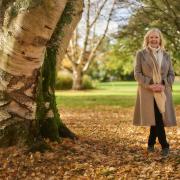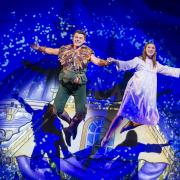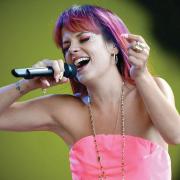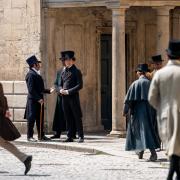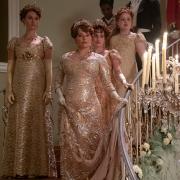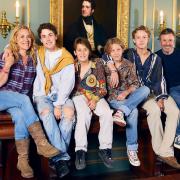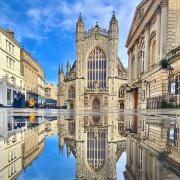As the Rugby World Cup nears an end, FERGUS EWBANK talks to Mike Tindall about retired life after glory for club and country

After forging his career at Bath, rugby player Mike Tindall went on to play as a member of the winning 2003 Rugby World Cup team. Having firmly cemented his position as outside centre, Tindall held on to his number 12 shirt throughout most of his club career and his captaincy for England. After eight years playing for Bath, a time he looks back on fondly, Tindall eventually made the controversial move to play for Gloucester.
Having retired from professional rugby in 2011, he keeps himself busy both on and off the pitch with royal engagements alongside wife Zara Phillips, as well as appearances on reality TV shows and the occasional turn as a rugby pundit. Still playing weekend matches for the local club and coaching teams at a grass roots level, Tindall hasn’t lost his grasp on the sport just yet.
putting his passion for the sport to good use, Tindall is patron of the charity Rugby for Heroes, which helps ex-military personnel find their way back into civilian life, getting them back in work and feeling connected with their family again.
He recently hosted the charity’s annual golf day, an initiative he worked to implement, teeing off for its third year. Originally an idea that Tindall and others at Rugby for Heroes planned as a one off, the event has continued to gain momentum. The day focuses on getting people who’ve been injured in action involved with the sport. An example Tindall gives is that of Paul Swayne, an ex-serviceman who lost an arm fighting and is now a 12 handicapper.

One of the reasons the charity has flourished is because of the longtime associations between rugby and the military. For Tindall, the connection goes beyond the exterior ‘rough and tough’ mentality, for him it comes down to a life governed by similar rules.
“I think that the leadership, the team bonding, the work ethic, all these things really do overlap,” he says. “Having a laugh in the face of adversity as well, when you’re hurt or you’re going through bad times, we have the same sort of sense of humour as those guys do, and I think that’s why we get on so well.”
The charity is in the process of launching a course that will help ex-service men and women transition back into civilian life through rugby coaching. Though retired from professional rugby, Tindall’s involvement with the sport remains as strong as his presence on the pitch.
Understandably - as with any ex-sporting professional - his claim of now having complete fulfilment, and ‘no regrets’, is coloured with a flicker of uncertainty. A series of injuries prevented Tindall from playing with the Lions in both 2001 and 2005, something he’s sad to have missed out on. That said, his time playing for the Barbarians Football Club, the somewhat misleadingly-titled rugby union team, did mean that he would go on to compete against the Lions, if not for them.
With almost 100 caps playing for England, Tindall is by no means sore. “I was lucky enough to get all the caps that I got and have such great memories in an England shirt, a Bath shirt and a Gloucester shirt,” he says. “If there was anything I would change, it would be that I would have wanted to win more stuff with a club.”
He spent the formative years of his career playing some brilliant rugby for Bath, a period he regards as crucial to his development as a player. Tindall joined the club straight after school at the age of 18 and, after just two years, had begun regularly playing at both club and country level.
“You have to be closely attached to where you start,’ he says, looking back on his time at the club “and if it wasn’t for those guys you could probably say I never would had the career that I’ve had.’
It was during his earlier years at Bath that Tindall made the outside centre position his own. Playing in partnership with inside centre Will Greenwood, it was in this capacity that Tindall helped lead England to victory in the 2003 Rugby World Cup.
Standing by the fact that ‘the fans were brilliant’, Tindall puts his decision to leave the club down to lengthy periods of absence due to injury and a ‘time for change’. Returning from injury in 2005, Tindall took up a place at rival club Gloucester and regained his place as number 12 for England. Though plagued with further injuries in the nine years that followed, Tindall would continue to deliver results for both club and country.
Though he may have retired from his on-pitch role, whenever there’s an opportunity to offer up opinions in rugby punditry he is eager to step in. He gets very excited when talk turns to this year’s Rugby World Cup.
“I think it will be massive,” he remarks, keen for the tournament to come home. Here is a man who believes wholeheartedly - as any ex-player would - in the potency of a World Cup hosted in his or her own country.
Tindall sees a nation growing evermore passionate about the sport, for him there seems a real belief that the team has what it takes to do well in the tournament.
“You just know that if England can start well, that will start swelling and growing,” he says, seriously. The nation will need to rally in support of our team, because as Tindall explains, ‘Twickenham is a very daunting place to play’, during the World Cup or otherwise. Clearly, and understandably from a man who’s played as a part of it, he holds our current national squad in high regard. For him, this year’s competition will give rugby ‘a real chance to jump out of the page and stamp some authority as one of the leading English sports’.
When it comes to his own Cup glory, Tindall admits, “you forget sometimes. Sometimes it’s nice to be reminded.” Seeing England once again raise the trophy this summer would no doubt jog his memory. Personal motives aside, Tindall is well aware that growing interest in the sport will greatly benefit the Rugby for Heroes charity, for which he is so tirelessly committed. For that reason alone, we stand by his hopes for glory at Twickenham.
After forging his career at Bath, rugby player Mike Tindall went on to play as a member of the winning 2003 Rugby World Cup team. Having firmly cemented his position as outside centre, Tindall held on to his number 12 shirt throughout most of his club career and his captaincy for England. After eight years playing for Bath, a time he looks back on fondly, Tindall eventually made the controversial move to play for Gloucester.
Having retired from professional rugby in 2011, he keeps himself busy both on and off the pitch with royal engagements alongside wife Zara Phillips, as well as appearances on reality TV shows and the occasional turn as a rugby pundit. Still playing weekend matches for the local club and coaching teams at a grass roots level, Tindall hasn’t lost his grasp on the sport just yet.
Putting his passion for the sport to good use, he is patron of the charity Rugby for Heroes, which helps ex-military personnel find their way back into civilian life, getting them back to work and feeling connected with their families again.
He recently hosted the charity’s annual golf day, an initiative he worked to implement, teeing off for its third year.
Originally an idea that Tindall and others at Rugby for Heroes planned as a one off, the event has continued to gain momentum. The day focuses on getting people who’ve been injured in action involved with the sport. An example Tindall gives is that of Paul Swayne, an ex-serviceman who lost an arm fighting and is now a 12 handicapper.
One of the reasons the charity has flourished is because of the long time associations between rugby and the military. For Tindall, the connection goes beyond the exterior ‘rough and tough’ mentality, for him it comes down to a life governed by similar rules.
“I think that the leadership, the team bonding, the work ethic, all these things really do overlap,” he says. “Having a laugh in the face of adversity as well, when you’re hurt or you’re going through bad times, we have the same sort of sense of humour as those guys do, and I think that’s why we get on so well.”
The charity is in the process of launching a course that will help ex-service men and women transition back into civilian life through rugby coaching. Though retired from professional rugby, Tindall’s involvement with the sport remains as strong as his presence on the pitch.
Understandably - as with any ex-sporting professional - his claim of now having complete fulfilment, and ‘no regrets’, is coloured with a flicker of uncertainty. A series of injuries prevented Tindall from playing with the Lions in both 2001 and 2005, something he’s sad to have missed out on.
That said, his time playing for the Barbarians Football Club, the somewhat misleadingly-titled rugby union team, did mean that he would go on to compete against the Lions, if not for them.
With almost 100 caps playing for England, Tindall is by no means sore. “I was lucky enough to get all the caps that I got and have such great memories in an England shirt, a Bath shirt and a Gloucester shirt,” he says. “If there was anything I would change, it would be that I would have wanted to win more stuff with a club.”
He spent the formative years of his career playing some brilliant rugby for Bath, a period he regards as crucial to his development as a player. Tindall joined the club straight after school at the age of 18 and, after just two years, had begun regularly playing at both club and country level.
“You have to be closely attached to where you start,’ he says, looking back on his time at the club “and if it wasn’t for those guys you could probably say I never would have had the career that I’ve had.”
It was during his earlier years at Bath that Tindall made the outside centre position his own. Playing in partnership with inside centre Will Greenwood, it was in this capacity that Tindall helped lead England to victory in the 2003 Rugby World Cup.
Standing by the fact that ‘the fans were brilliant’, Tindall puts his decision to leave the club down to lengthy periods of absence due to injury and a ‘time for change’. Returning from injury in 2005, Tindall took up a place at rival club Gloucester and regained his place as number 12 for England. Though plagued with further injuries in the nine years that followed, Tindall would continue to deliver results for both club and country.
Though he may have retired from his on-pitch role, whenever there’s an opportunity to offer up opinions in rugby punditry he is eager to step in. He gets very excited when talk turns to this year’s Rugby World Cup.
“I think it will be massive,” he remarks, keen for the tournament to come home. Here is a man who believes wholeheartedly - as any ex-player would - in the potency of a World Cup hosted in his own country.
Tindall sees a nation growing evermore passionate about the sport and for him there seems a real belief that the team has what it takes to do well in the tournament.
“You just know that if England can start well, that will start swelling and growing,” he says.
The nation will need to rally in support of our team, because as Tindall explains, ‘Twickenham is a very daunting place to play’, during the World Cup or otherwise. Clearly, and understandably from a man who’s played as a part of it, he holds our current national squad in high regard.
When it comes to his own Cup glory, Tindall admits, “you forget sometimes. Sometimes it’s nice to be reminded.”
Seeing England once again raise the trophy this year would no doubt jog his memory. Personal motives aside, Tindall is well aware that growing interest in the sport will greatly benefit the Rugby for Heroes charity, for which he is so tirelessly committed.
We stand by his hopes for glory at Twickenham.






